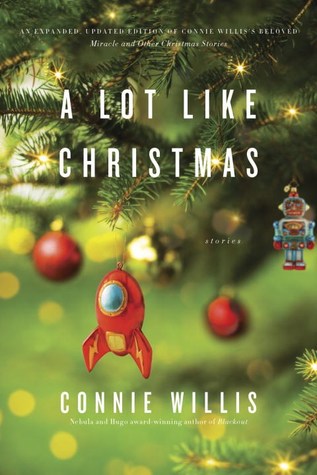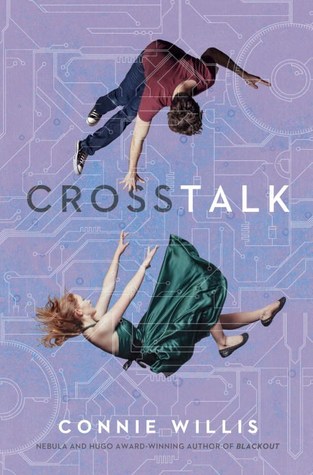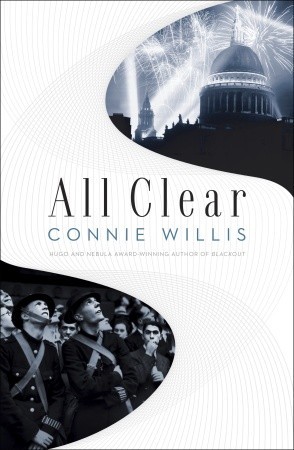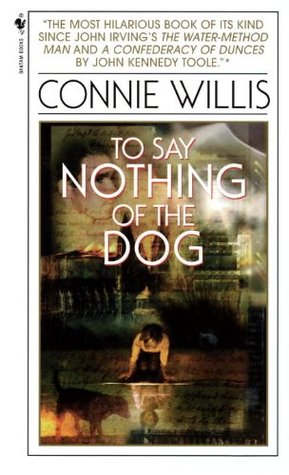
Book Review: Doomsday Book by Connie Willis
To say I loved this book is a huge understatement. I adored every single thing about it and am sure I will read it again.
It’s a pretty long book, the first in the Oxford Time Travel series, so to explain the plot without spoilers is difficult.
But in a brief summary, in the near future, 2053, Oxford University performs time travel ‘drops’ to study the past. Scholars have visited the last couple of centuries frequently, studying Egyptian tomb openings and the second world war for example, but some times are deemed far too dangerous to contemplate. Now, however, one student, Kivrin, is allowed (by default, really) to visit the 1300s, which Oxford has rated as 10/10 on the danger scale, to fill in some of the blanks for the history books.
The opening of the book shows Kivrin’s determination to go ahead with the drop, despite her teacher’s, Mr Dunworthy, grave warnings when it comes to that century’s ignorance and treatment of women. Although Kivrin was as prepared as she could be, both she and the head time travel technician catching the flu just as she is leaving sets a course no one could have predicted for both of the time zones.
The book moves into alternative narratives of Kirvin in the past, and Mr Dunworthy in the present (our future).
In the 1300s, we get to see Kivrin cohabitating with a peered family who are staying in a small Oxford village while the rest of their family remain in Bath. There is a mother, mother-in-law, and two daughters – Rosamund, aged around 12 and Agnes, around 5. Other than the family, Kivrin forms a deep friendship with the local priest, Father Roche.
Meanwhile, in 2053, the flu quickly reaches epidemic proportions and whatever could go wrong, does. Due to all these unforeseen problems, no one will be able to open the time travel ‘net’ to fetch Kivrin at the predetermined time.
I’ve seen lots of complaints online about the ‘future’ scenes, but they were definitely my favourite. (I gasped when someone even suggested skipping them altogether!) The old-fashioned feel to the future (some have suggested it reads like England of the 1950s) was wonderful. It gave the book a classic sci-fi feel akin to a Wyndham novel that worked for me. I would actually say I would skip the Kivrin scenes before I would skip the Dunworthy ones.
All of Willis’s characters are so well written, and their personalities are explained with the ‘show not tell’ method. We learn their traits and flaws from the way they act. The children act like children — often self-centred and needy, but ultimately innocent and in need of protection. And I liked the way all the supporting characters have their reason for being and their purpose when explaining the conflict of the plot. For example, Miss Montoya comes across as selfish and annoying until we get a touching scene of her studying the wrist bones of bodies in an archaeological dig.
Professor Dunworthy was a wonderful character. I’m so excited to realise that he features in the other books in the series. My favourite of the main characters, however, was Dunworthy’s best friend, Doctor Mary Ahrens. She’s a complete standout. I could probably write a thesis based on my adoration of her.
Talking of theses, there could be several written on the book’s themes. One that features heavily is Willis showing us the good and bad side of religion. Many of the religious characters introduced are hypocritical, indulgent and selfish. However, the church is not portrayed as evil and a great many parallels exist between Mr Dunworthy and God. (As Mr Dunworthy is as close as we get to a hero in the book, this is not a case of heresy.) Religion is supposed to encourage forgiveness, empathy and selflessly tend to others in time of sickness — something many of the characters do at various times in the book.
Love in its purest and most destructive form is also covered.
Kivrin develops a deep maternal love for Rosamund and Agnes. Their real mother, however, is too preoccupied with her frivolous love for one of her servants to offer the girls any real guidance. Rosamund’s unwavering insistence of her father’s love may or may not be unreliable, but the reader knows for sure that her arranged marriage will have very little to do with love if allowed to go ahead. Despite Kivrin’s initial fear due to his appearance, she also develops a deep love for Father Roche. This remains a pure and platonic love despite there being the tiniest hint that it could have developed into romantic love if circumstances could have allowed.
In the present, Mary’s great nephew, Colin, is completely neglected by his mother, leaving Mary and Mr Dunworthy to take over and they both easily develop a grandparental type love for the boy. An annoying thorn in Dunworthy and Colin’s side is Mrs Gaddson, who is not a bad mother per se, but has no understanding of her own child’s personality. And obviously, Dunworthy treats Kivrin as he would his own daughter.
I could go on and on. I’d like to say you can enjoy the book simply as entertainment, but I don’t think it’s true. Like me, you won’t be able to stop thinking deep thoughts after you read.
The audiobook version was very good. I enjoyed Jenny Sterlin’s narration very much. There were many amusing moments in the book and I thought she captured them well.
The Doomsday Book isn’t a comedy though, so I need to warn you to keep a box of tissues on hand. I saw a lot of the events coming, but it still didn’t stop me from crying. Willis basically ripped out my heart at one stage. Still, I’m off to start the next book in the series.
5 out of 5 obviously.

















